Top Pick for
Best NAS device for media consumption
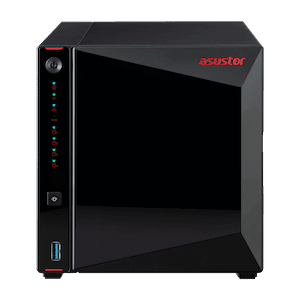
Top Pick for
Best NAS device for media consumption

Top Pick for
High-performance NAS device
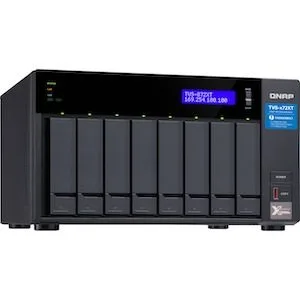
Top Pick for
Easy-to-use NAS device
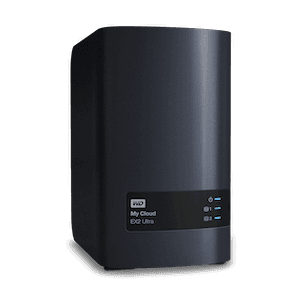
Top Pick for
Disaster-resistant NAS device
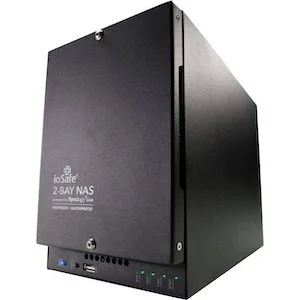
Finder's team looked into more than one hundred NAS devices made by some of the world's leading manufacturers and chose these top picks based on product details and customer reviews. In each category, we extensively compared products to determine the best fit based on features and cost.
Read more detail on our methodology below.
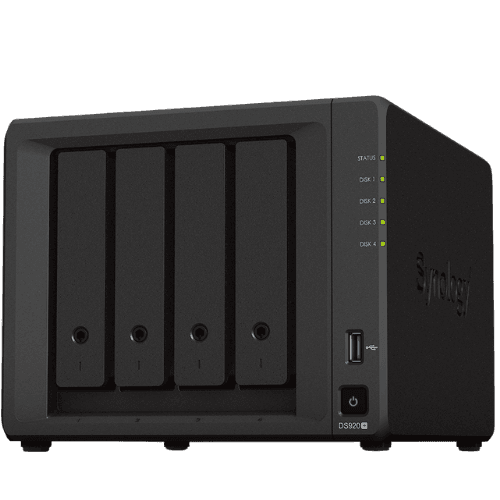
With over 40 products in its NAS line-up, Synology knows a thing or two about what makes a NAS device worth your hard-earned money. With an unbeatable user interface, a great set of features and a price that's in line with the rest of the industry, the company's mid-tier, four-drive bay-equipped DiskStation DS920+ is the best NAS device on the market.
The relatively simplistic enclosure supports up to four full-sized mechanical hard drives (3.5-inch). Those same slots can handle the smaller 2.5-inch form factor found on some hard drives and SATA SSDs. There are also an additional two M.2 slots for speedy NVMe SSDs, which can act as caches to speed up the slower, bulkier storage drives (though these are absolutely not essential).
Like the vast majority of the enclosures on this list, Synology's DS920+ typically doesn't come with drives pre-installed. Some retailers are willing to sell you bundles that include NAS drives, but you'll likely have to source these yourself. We've got more information about NAS drives over at our NAS buying guide.
While the NAS enclosure itself is fantastic overall, the stand-out point separating it from the competition is Synology's DiskStation Manager (DSM) interface. DSM includes heaps of features in a snappy package, allowing you to organise your photos, stream videos, collate your music and much more. Other brands do have comparable interfaces, they're just not as good as Synology's offering.
It's not all perfect, though. The Intel Celeron processor is decent, but won't knock your socks off, and the Ethernet ports on the device aren't the fastest.
Synology clearly impressed buyers with its DS920+, with the device boasting a 4.8 out of 5 star rating from more than 450 reviews on Amazon. What's even more impressive is the remarkably low number of negative ratings, with 5- and 4-star reviews accounting for 96% of all reviews for the enclosure. Happy customers sang high praises of Synology's DSM interface, and others were pleased with the device's low noise. There were a few minor complaints about Synology's use of Gigabit Ethernet, though.
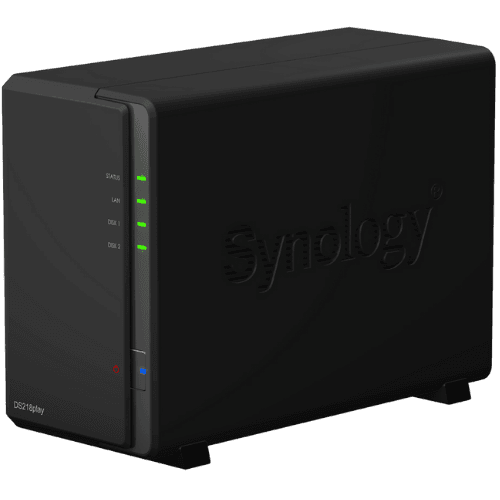
NAS devices aren't all that cheap, and neither are the drives specifically designed to go in them, but Synology's entry-level DS218play makes the technology more accessible. With plenty of support for media playback and a smaller, more compact design, the DS218play is the best budget NAS device on store shelves today.
Marketed as a "personal multimedia library" by Synology, you'd expect the DS218play to be really good at video streaming, as well as photo and music storage. Luckily, built-in hardware transcoding means you can enjoy 4K video up to 60 frames per second straight from the NAS, and the DiskStation Manager software allows for easy storage and organisation of all of your photos and tunes.
For some reason, Synology basically refuses to put HDMI ports on its NAS enclosures. It seems a little counterintuitive, given many use NAS devices for media consumption, but it's even less sensible on this unit which literally has "play" in its name. It's not some industry standard to omit the output, either. Synology's main competitors, QNAP and Asustor, don't shy away from putting HDMI ports on NAS drives, even budget ones.
The device can fit two full-sized drives into its relatively compact 870-gram body, though it'll be quite a bit heavier if you load both bays with traditional hard drives.
The specs on the DS218play aren't the snappiest. Synology kitted out the unit with a quad-core Realtek processor and just 1GB of DDR4 memory, so it'll be fine for most tasks, but might struggle under intense usage.
In the eyes of the consumer, Synology seems to have gotten budget NAS devices right. From more than 250 reviews on Google, the DS218play earned itself an impressive 4.6 out of 5 rating, with buyers happy with the device's speeds and ease of use. Some weren't quite as pleased with the enclosure's design, particularly the plastic housing.
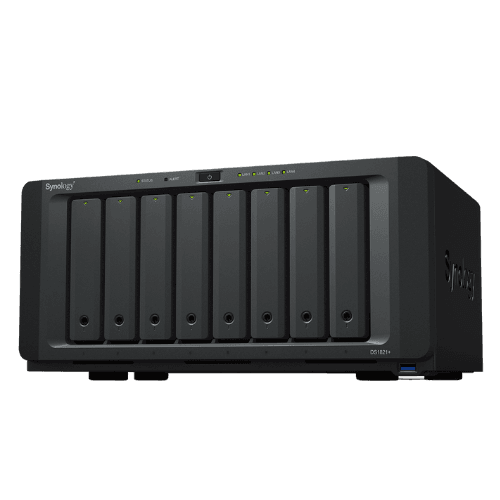
For some, four drives just won't cut it. Synology's DS1821+ is hot off the assembly line, and with room to fit eight full-sized 3.5-inch hard drives, you probably won't have to worry about storage for a long time. While all that space comes at a steep price, the beefy NAS drive is the best high-capacity unit you can buy.
Targeting techies and small to medium-sized businesses, Synology loaded the DS1821+ with plenty of performance to make it fit for whatever gets thrown at it. The company went with a quad-core AMD Ryzen processor to power the enclosure, a sign of shifting tides in the CPU space. There are just 4GB of memory pre-installed, but if you find you need a bit more, you can load up to 32GB of DDR4 into the 6kg device.
At its core, the DS1821+ is for those who need an absurdly large amount of storage space. There are a whopping eight drive bays, which allow for both 3.5-inch and 2.5-inch hard drives or SSDs. There's also space for dual M.2 SSDs that can act as a cache for your main drives.
You can theoretically have up to 18 drives connected to the DS1821+, but no one should actually try that. You'd have to be willing to fork out an extra $700+ (each) for two of Synology's DX517 expansion units and however much for all of those drives. If you genuinely need that much storage, a NAS might not be the best way to go.
While NAS pricing is super variable, you can expect to pay at least $1,500 for the DS1821+, and that's without forking out hundreds of dollars for high-capacity storage drives. The price becomes even harder to justify when you realise Synology wants you to pay extra for faster networking. The drive comes with four Gigabit Ethernet ports, which is rough when competitors such as Asustor put faster 2.5 Gigabit ports on devices that are half the price. The enclosure does support 10 Gigabit networking, but that'll cost extra.
The DS1821+ is relatively new, releasing in late 2020. So while you're getting the latest tech from one of the world's leading NAS device manufacturers, there's not much in the way of customer feedback and reviews just yet. Still, early adopters seem to be pretty happy with their investment, with an average review score on Google of 4.9 out of 5 from 9 reviews. All four reviews on Newegg give the device a 5 out of 5 rating, and B&H's average review score is 4.5 out of 5.
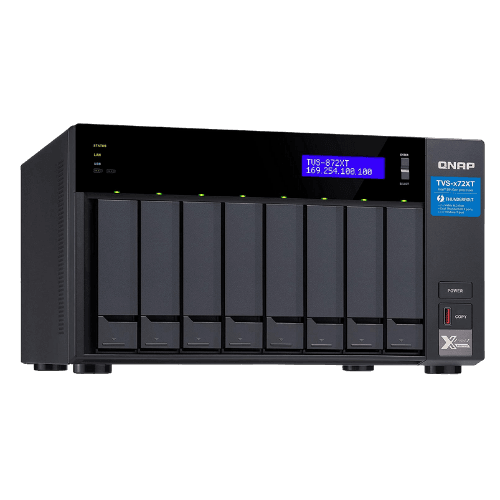
High-performance hardware is crucial to keep a NAS device running smoothly under any workload. Luckily, with an Intel Core i5 processor and 16GB of memory, QNAP's TVS-872XT is no slouch. When you also factor in the speedy ports for file transfer and eight drive bays, it's the best high-performance NAS device money can buy.
The TVS-872XT can be loaded up with eight full-sized 3.5-inch hard drives and is compatible with the smaller 2.5-inch form factor frequently found on SSDs and some laptop-based hard drives. There's also room for two M.2 SSDs for caching if you're looking to boost performance even further.
Even though it costs as much as some pre-owned cars, the high-performance TVS-872XT is an appealing choice for anyone wanting a NAS that won't blink an eye when put under the pump. The hexa-core Intel Core i5 8400T, alongside 16GB of DDR4 system memory, can handle anything from 4K video playback to powering your own VPN server. The beefy hardware also allows for rapid file transfer via the two Thunderbolt 3 ports on the back of the device (so long as you have a supported device, such as the MacBook Pro and XPS 13).
QNAP thoughtfully includes 10 Gigabit networking on the high-end enclosure, so data transfer speeds are blazing fast across your network, too. That is, so long as your network can keep up.
With all of that hardware and space, the TVS-872XT isn't the smallest, lightest or most attractive NAS on the market. Its big microwave-esque design means it's going to feel most at home in an office, rather than next to a TV. You definitely won't want to be moving the device around, though, since it weighs a whopping 7.06kg when empty.
QNAP's pricey TVS-series devices received a decent 4.1 out of 5 star rating from almost 100 reviews on Amazon. Customers were happy with the enclosure's inclusion of two Thunderbolt 3 ports. Buyers were also chuffed with the included 10 Gigabit Ethernet ports, but weren't quite as pleased with the device's reliability.
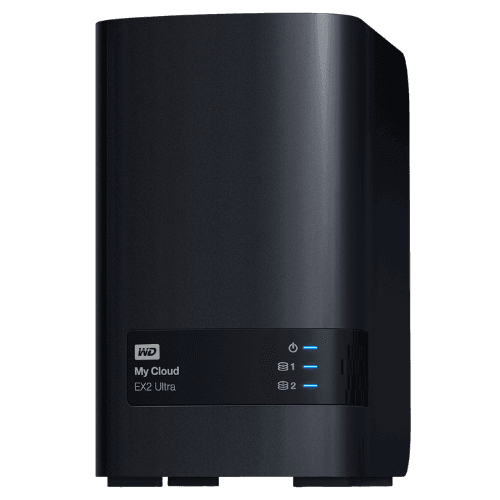
Sometimes the most painless solution is the best one. WD's older-yet-user-friendly My Cloud EX2 Ultra comes with its drives pre-installed and has one of the most simple set-up processes out of any NAS device, making it the best easy-to-use NAS enclosure on the market today.
Setting up the My Cloud EX2 Ultra is super easy. Since the drives are pre-installed, it's practically ready from the moment you take it out of the box and turn it on. You'll have to set up your accounts so you can access the drive from anywhere, but other than that, you'll be good to go right away.
WD's My Cloud interface is pretty simple, with almost everything you'd need to check or access available from the main dashboard. There's also a My Cloud app, so you can access all your files when you're on the go.
The My Cloud EX2 Ultra isn't the prettiest NAS drive on the market, although as you might have observed, not many of them are particularly stunning. Still, WD hasn't given much attention to its NAS devices in recent years. Many of its newer products feature a square, modern design, while this one features the company's older, rounded look.
If you're really keen on getting the My Cloud EX2 Ultra, but don't want to settle for just 8TB of storage, you can pick up models with up to 28TB pre-installed. If you'd prefer to pick your own drives, there's a diskless model too.
The My Cloud EX2 Ultra earned a 4.2 out of 5 rating from more than 700 reviews on Amazon, with customers lauding the device's online features, as well as its pain-free set-up. Some people did experience issues with the device's reliability and with WD's support, though.
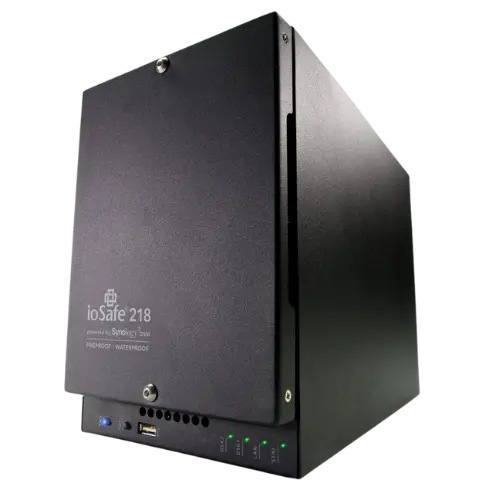
If you're living in a disaster-prone region, it might make sense to keep your data safe in a protected enclosure. The ioSafe 218 NAS device is capable of shielding your data from destruction in floodwater or a ferocious fire. While its price is pretty steep, it's the best NAS device for those wanting to protect their files from the elements.
The main selling point of the 218 NAS is its disaster-resistant design. The enclosure's IP68 water resistance means any precious data will be safe from fresh or saltwater for up to 72 hours, so long as it's not stuck more than 10 feet deep. The device can also withstand intense fires up to a temperature of 1,550°F (for us Aussies, that's around 843°C) for 30 minutes. While it'd be best if no one ever had to use these protective features, it's good peace of mind for those who worry about this kind of thing.
You can fit two 3.5-inch drives into the (relatively) small enclosure, and it'll only support up to a total of 24TB of storage space. That number might fluctuate depending on the RAID configuration used, though.
With a quad-core Realtek processor and 2GB of DDR4 memory under the hood, the 218 NAS isn't particularly powerful. Continuing the trend of unimpressive components is the single Gigabit Ethernet port on the device. It's following in the footsteps of Synology, which often only includes Gigabit Ethernet too. Another thing ioSafe has in common with Synology is that it uses the company's DSM software, so you can do anything a typical NAS would on this beefy enclosure.
As a niche product, there aren't as many reviews for the ioSafe 218 on Amazon as there are for more mainstream enclosures, but every review gave the disaster-resistant NAS a 5 out of 5 rating. The same is true on Google, with the two ratings both being 5 out of 5. Buyers were happy with the device's set-up and its use of DSM.
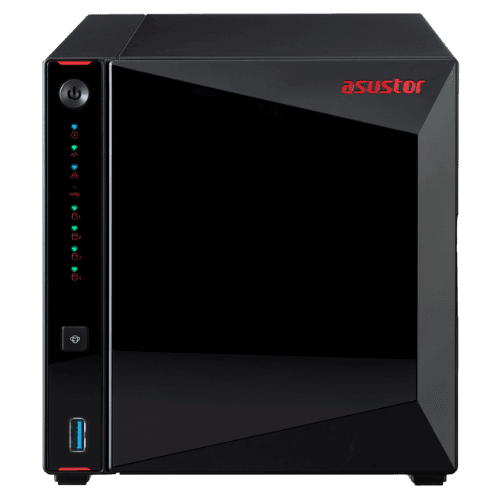
Built from the ground up for gamers and streamers, Asustor's Nimbustor 4 packs in a gamut of features designed to make storing and watching content on the NAS a pain-free process. While its noticeable red-accented gamer aesthetic might not be to everyone's taste, the AS5304T is the best NAS device out there for media consumption.
Asustor has packed decent hardware into the four-drive bay enclosure, with a quad-core Intel Celeron J4105 processor and 4GB of DDR4 memory. Using all four bays, the Nimbustor 4 can store up to 76TB of data, so you won't have to worry about whether you can store all of your photos and videos on it. Speaking of videos, you can easily watch content back from the NAS in 4K thanks to a built-in hardware decoder.
The Nimbustor 4 follows design cues from ASUS's gaming division, Republic of Gamers, displayed through the case's red accents and plastered through all the device's marketing. While it's not too aggressive, it has a noticeably less basic design than most comparable NAS enclosures on the market. Some will love it for its different style, whereas others will hate it. It's all a matter of personal preference. Focusing on the gamer and streamer demographic, there are a bunch of features on the device that make saving gameplay from Twitch and YouTube a breeze.
Many customers mentioned that the Nimbustor 4 could get loud, which isn't fantastic for those looking to use the media-centric device as the centrepiece of a home theatre system. The extra noise could be distracting if you're trying to settle down and watch a movie or show, so it might be better suited for the office. Though, that would mean the built-in HDMI 2.0a port would likely go to waste.
Asustor's "gaming-inspired" NAS sports a 4.5 out of 5 rating from almost 200 customer reviews on Amazon. Buyers were happy with the device's stellar performance, media features and ease of use. Many were unimpressed with Asustor's support, experiencing hard to resolve issues due to poor customer service.
There's a seemingly endless supply of NAS devices on the market, so we looked into more than 110 of the most prominent models from the brands mentioned below:
We looked at key specifications and features to figure out which enclosures were the best pick in each category. We weighed up key features, such as performance, design, ease of use, drive bays, user interfaces and value for money. In our final round-up, we only selected devices that are easy for Australian consumers to get their hands on.
NAS device pricing is incredibly variable, and big manufacturers make the recommended retail prices for enclosures hard to find. We opted to use an average retail price to provide a better indication of what you could expect to pay if you decide to pick up one of these units. We calculated the average retail price by using price data from three or more retailers.
Following an extensive investigation into each product and after reading hundreds of customer reviews, we ended up with what we think are the seven best options for anyone looking to expand their home storage capabilities with a NAS device.
A NAS drive is a high-capacity storage unit that connects to all the computers and mobile devices in your home or office via your local network. It can also be accessed over the Internet when you're away from home. While traditional external hard drives must be physically plugged and unplugged when moving files between devices, NAS drives offer a quicker and easier way to store, stream and share files.
NAS drives are typically self-contained units that hold one or more hard drives and allow multiple users to access data. They're quick and easy to set up, and many units allow you to replace their hard drives with larger-capacity models if you need more storage space.
There are several reasons why you might want to buy a NAS drive:
However, if you don't have any need to share your files with other users and if your file storage requirements are adequately met by your current set-up, there's probably no reason for you to consider a NAS drive.
Most people who only have one or two computers at home will probably be able to get by using USB drives or even an external hard drive to share and back up files.
NAS drives should not be confused with online cloud storage, which allows you to upload and share files to "the cloud". The cloud refers to a server or network of servers connected to the Internet and it can be accessed from any computer, phone or other electronic device with an Internet connection. Check out our online cloud storage service guide for more info on how to use cloud storage.
There are two main types of NAS drives:
Some NAS drives are available in both prepopulated and unpopulated form. If this is the case, make sure you compare the price difference between the two models to determine whether the included hard drives provide good value for money.
The other main way to distinguish between NAS drives is to consider their storage capacity, which is determined by the number of bays (or slots) it has for hard drives:
The number of bays is important because NAS units with two or more drives allow you to create a more effective redundant array of independent disks (RAID). This basically means merging all the hard drives in your array into one logical unit, allowing you to protect your data in case of drive failure and also enjoy performance benefits.
For example, let's say you have a two-bay unit with two 2TB drives. By mirroring the contents of one drive to another, you ensure that your data remains safe and accessible even if one of the drives fails. However, this configuration (known as RAID 1) means your unit only has 2TB of space available, not 4TB.
When choosing a NAS drive, you'll need to consider your file storage and sharing needs both now and into the future. By comparing the storage capacity, ease of use and connectivity of the units in your price range, you'll be able to buy a NAS drive that meets your requirements. Make sure you consider:
For most home users, a drive with two bays is ideal because it allows you to mirror the contents of one drive to the other. NAS drives for business offer four, eight or even more bays. Single-bay drives are not recommended for most users because of their lack of redundancy.
NAS units can come with drives already inside or with space for you to insert your own drives, so make sure you know what type you're getting.
If you choose a unit with hard drives already included, check whether you can replace those drives with new ones should your storage needs expand in the future. If you can insert your own drives, check whether the manufacturer provides a list of compatible models.
NAS manufacturers offer their own programs, apps and online services you can use to manage your storage. These can sometimes be complicated and confusing for the average user, so look for a NAS drive with easy-to-use software.
DLNA (digital living network alliance) is a protocol that allows devices from different manufacturers to communicate with one another over a network. Most NAS units support DLNA, which is important because it allows you to stream media content to other DLNA devices (like your smart TV, tablet or games console) in your home.
Check the specs sheet for details of the drive's CPU and its processing speed (measured in gigahertz). However, remember that because this is a storage unit, it won't need anywhere near as much power as your desktop computer.
Check the amount of RAM as well – the more RAM a NAS unit has, the quicker it will be able to access data.
If you want to replace a broken hard drive or increase your storage capacity, and if you want to do this without shutting down your NAS system, look for a unit with hot-swappable drive bays.
Check what built-in security features a unit offers, including password encryption and the ability to set up firewalls.
NAS drives are designed to be turned on 24/7, so check how much power a unit will consume before buying.
Available RAID configurations
There are several different types of RAID, so check which of the following your NAS drive can be configured to support:
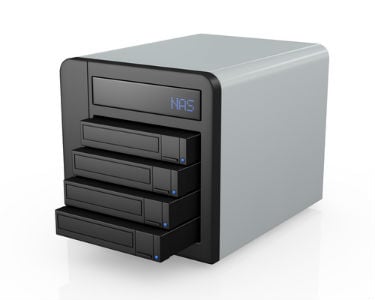
If you buy a unit that doesn't include built-in hard drives, you'll need to shop around to find suitable hard drives. However, don't assume that you can just go out and buy any old drive.
Many hard drive manufacturers offer NAS-optimised hard disk drives. While they cost more than normal hard drives, they've typically been designed to run 24/7. NAS-optimised drives feature special firmware to improve long-term reliability, reduce operating temperatures and offer better performance.
Some also come with an extended warranty, but just make sure you check your NAS unit's list of compatible hard drives (if such a list exists) before you buy.



We've compared dozens of models to find the best 3D printer in Australia, whether you're a first-time buyer or just looking to upgrade.
Work, learn and play with one of the best Chromebooks you can get your hands on in Australia right now.
From the best option for gaming to the top model for battery life, these are the 9 best student laptops online.
We’ve found the 7 best all-in-one PCs, from the top option under $750 to the best for seniors.
These are the 7 best USB-C hubs you can buy right now in Australia.
Looking to protect the computers, tablets and smartphones under your roof from malicious viruses? Compare providers available to Australians today.
Shop across a great range of laptop models at these trusted online stores.
Compare accounting software side-by-side to find the best program to support your business.
These are the 10 best VPNs to help you protect your online privacy and access geoblocked content.